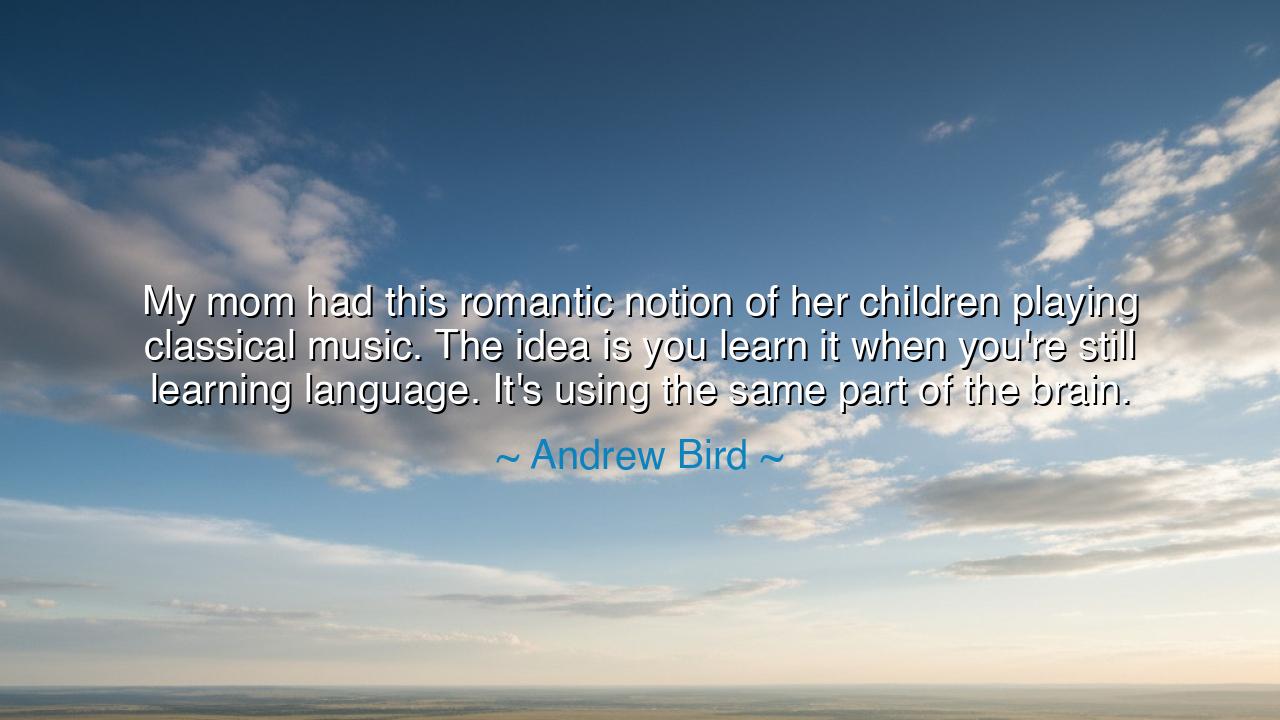
My mom had this romantic notion of her children playing classical
My mom had this romantic notion of her children playing classical music. The idea is you learn it when you're still learning language. It's using the same part of the brain.






In the words of Andrew Bird, a master of strings and voice, there is a remembrance both tender and profound: “My mom had this romantic notion of her children playing classical music. The idea is you learn it when you’re still learning language. It’s using the same part of the brain.” In these words lies more than nostalgia—it is a meditation on the kinship between word and melody, between discipline and imagination, between the inheritance of culture and the innocence of childhood.
The ancients knew this bond well. They spoke of the muses, who governed both poetry and music, teaching mortals that speech and song are but two rivers flowing from the same source. To give a child music while they are still learning language is to feed both streams at once, to enrich the mind with rhythm, memory, and harmony. The child who plucks at strings or breathes into a flute learns not only notes, but cadence, patience, and order—the same virtues required to shape words into meaning.
Bird speaks of his mother’s romantic notion—a dream perhaps, but one rooted in deep wisdom. Many parents dream their children into artistry, but in this vision lies a truth: that what is planted early may flower abundantly. Just as a young tongue bends easily to the sounds of new words, so too can young fingers and ears bend to the grace of classical music. The child may resist, yet the seed remains, and in time it may bloom into a gift that shapes the soul forever.
History bears this out. Consider the life of Mozart, who as a child was given to the piano and violin before he had even mastered conversation. To him, music and language were not separate disciplines but one flowing current. He spoke in melody as naturally as others spoke in words, and from this harmony came compositions that still echo across centuries. His genius reminds us of what Bird’s mother believed: that the child’s mind, supple and open, can carry music as easily as speech, and from this union create wonders.
The deeper meaning of Bird’s words is that music is not an ornament to life, but a language of its own. To be given classical music as a child is to be given another vocabulary, one that speaks in emotions, textures, and rhythms. It awakens parts of the spirit that mere words cannot touch. And though many may lose the discipline of practice, the resonance remains—the mind trained in music forever hears the world with sharper ears, forever speaks with greater rhythm and grace.
The lesson is clear: we must honor the role of music in the shaping of the human soul. It is not a luxury, nor an afterthought, but a companion to language, a builder of intelligence, memory, and empathy. Just as a child learns to speak, so should they learn to listen, to play, to feel the vibrations of sound as part of their very being. In nurturing music, we nurture the wholeness of the mind and heart.
Therefore, O listener, take heed. If you are a parent, give your child the gift of music as you give them words. If you are grown, do not believe it is too late; let your hands still learn the strings, let your breath still seek the flute, let your voice still find its song. For in doing so you awaken the ancient unity within, the truth that language and music are not rivals but companions, both carrying the soul toward beauty, toward wisdom, toward eternity.






AAdministratorAdministrator
Welcome, honored guests. Please leave a comment, we will respond soon